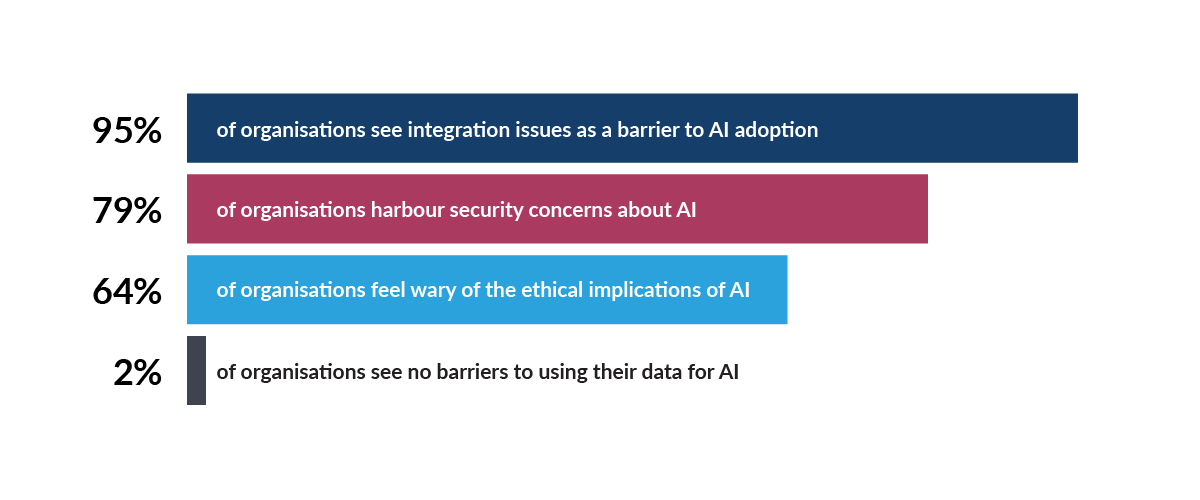Many of us have become caught up in AI this past year. Reports have highlighted the expectations that AI will address inefficiencies, speed up processes and liberate workforces from manual work. MuleSoft’s 2024 Connectivity Benchmark Report reminded us of the key challenges to adopting AI. 95% of organisations cited integration issues as a barrier to adoption, 79% harbour security concerns, and 64% feel wary of the ethical implications. Only 2% see no barriers.

Source: MuleSoft.
You can reduce the impact of barriers like these and maximise the success of AI by carefully planning your adoption strategy. Here are five questions we recommend asking of your business before adopting AI.
How will you use AI?
Before adopting AI, you must understand how precisely your organisation will leverage it. For example, if you want to incorporate AI into customer service, consider whether it will guide customer interactions or provide insights to agents. You can begin a planned deployment once you know how it will support the business.
When planning AI implementation, you should pinpoint specific processes that will drive the most benefit. Perhaps your organisation has the goal of increasing customer service speed. Your AI initiatives should align directly with organisational goals to ensure the investment contributes to key outcomes. Establishing clear metrics for success is crucial; this might include measuring efficiency improvements, customer satisfaction rates, or impact on revenue. By setting these parameters early, you can better track the effectiveness and value of your AI initiatives.
Who is running your AI play?
AI’s success in your business relies on the team behind it. You will need a dedicated leader who deeply understands the business objectives and technical aspects of AI. The right leader can navigate the complexities of AI technology while keeping your business’s interests at the forefront.
An AI leader will do more than guide the initial AI implementation. This leader will also manage and govern AI usage within the business. They will analyse success and identify improvements to ensure the AI strategy delivers business outcomes.
How much will you need to invest in AI?
AI implementation will involve upfront and ongoing investments. Initial investments include acquiring AI platforms, hiring or training talent with the necessary expertise, and data integration. Ongoing expenses such as updates, system maintenance, and continuous employee training are integral to keeping AI systems effective and aligned with business objectives.
Beyond the direct costs, hidden expenses often impact the total investment in AI. These may include upgrades to data management systems to ensure compatibility with AI or additional training for employees to work effectively with new systems. Before deploying AI, you should calculate these costs and understand what you can afford to invest.
What will the ROI be?
Once you have calculated how much you can invest, you must understand the ROI you expect to see. Establishing clear, measurable goals at the outset allows you to assess AI’s effectiveness in increasing operational efficiency, enhancing customer satisfaction, or driving revenue growth.
The timeline for realising the ROI from AI can vary depending on your organisation’s implementation and specific goals. It’s important to differentiate between immediate improvements and the long-term strategic advantages that AI can provide. Setting realistic expectations for ROI is essential, recognising that some benefits, especially those related to strategic positioning or innovation, may take longer to materialise.
Is your data ready for AI?
Effective AI adoption relies on high-quality, well-organised data to make accurate predictions and provide insights. In MuleSoft’s 2024 Connectivity Benchmark Report, 62% of IT leaders expressed that their data systems were not configured to fully leverage AI. Before adopting AI, your organisation must evaluate and correct your data’s cleanliness, relevance, and accessibility. Even the most sophisticated AI models will fall short and create unreliable outputs without a solid data foundation.
Additionally, as AI systems require substantial data processing capabilities, reviewing and possibly upgrading your data infrastructure is necessary. Ensuring your infrastructure can support the demands of AI technologies is essential for smooth operation and scalability, laying the groundwork for successful AI integration.
Conclusion
If you want to adopt AI in your organisation, it is not enough to switch it on. You must consider how it will support your business goals, drive outcomes and generate ROI. Simultaneously, you should understand the costs, the leadership required to drive initiatives, and the viability of your data to support AI. These foundational elements set the stage for successful AI integration and ensure that your investment aligns with the business objectives and maximises ROI.
Why choose MakeSense’s AI and Data Services?
MakeSense can guide your organisation’s AI and data strategy to address specific business challenges and opportunities. Our SenseMakers provide end-to-end support and use world-class technology platforms to help your business gain a competitive edge.
The future is AI-driven, and with MakeSense, it’s within your reach. Visit our AI & Data Services page to discover how we can transform your organisation.









